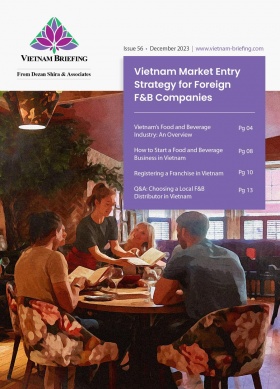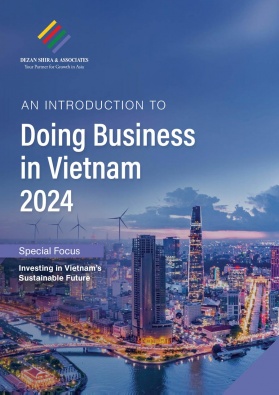Vietnam-New Zealand Investment and Trade Opportunities
Bilateral ties between the Vietnam and New Zealand remain strong, with renewed focus on investment opportunities in the renewable energy, real estate, and aviation sectors, among others. We discuss new areas for business and research collaboration between the two countries as well as top items in their commodity trade basket.
New Zealand’s burgeoning interest in investing in and expanding its operations in Vietnam has ignited a fresh chapter in the bilateral relations between the two nations. New Zealand enterprises are actively seeking support from the Vietnamese government to leverage opportunities in vital sectors such as renewable energy, real estate, and aviation.
This was echoed during a gathering between representatives of New Zealand firms and Vietnamese Prime Minister Pham Minh Chinh as part of the latter’s official visit to New Zealand on March 10, 2024. Subsequently, PM Chinh engaged in discussions with his New Zealand counterpart, Prime Minister Christopher Luxon, in Wellington the next day. Together, they led a press briefing with the central message advocating for advancing comprehensive cooperation.
In this article, we discuss recent developments in bilateral relations between New Zealand and Vietnam, with a particular focus on the sectors ripe for investment, trade, and collaboration.
Current developments in bilateral relations
Accompanied by a high-ranking delegation, PM Chinh commenced his official visit to New Zealand on March 9, 2024. In discussions with PM Luxon, both leaders reaffirmed commitments to bolster political trust and strategic cooperation, outlining plans to implement the Vietnam-New Zealand strategic partnership.
Key sectors highlighted for broadening cooperation include defense, security, agriculture, culture, education, and people-to-people exchanges. Luxon revealed a substantial NZ$6.24 million (approx. US$3.8 million) investment in Vietnam’s horticulture sector. The discussions also focused on increasing Vietnam-New Zealand bilateral trade to US$2 billion by the end of 2024 and to US$3 billion by 2026.
Lastly, the two leaders pledged mutual support at regional and international forums, underscoring their commitment to regional stability and cooperation.
Sustainability and innovation key to Vietnam-New Zealand cooperation
PM Chinh’s official visit included discussions with senior representatives, sessions with heads of associations and prominent businesses, working sessions with local scientific, technological, and educational institutions, and meetings with the Vietnamese community in New Zealand.
Addressing one of the seminars, he reiterated Vietnam’s commitment to attracting foreign investments that prioritize quality, efficiency, and sustainability. He emphasized the significance of environmentally friendly practices and the application of science and technology, encouraging New Zealand companies to deepen their engagement across various sectors.
Potential areas for collaboration identified by the prime minister are:
- Green and digital economy;
- Circular and knowledge-based economy;
- Science and technology (S&T);
- Electronics;
- Electric vehicles (EVs);
- Semiconductors;
- Essential minerals;
- Green finance;
- Biotechnology;
- Healthcare;
- High-tech agriculture; and
- Development of high-quality human resources.
Moreover, with approximately 15,000 Vietnamese nationals residing in New Zealand, PM Chinh emphasized the importance of continued support for Vietnamese companies operating in the country, facilitating their integration into global supply and production chains to benefit both nations. At the same time, he also pledged unwavering support and optimal conditions for foreign firms to invest and conduct business effectively and sustainably within Vietnam’s rapidly growing economy.
Notably, New Zealand business representatives expressed keen interest in Vietnam’s investment attraction policies, particularly in infrastructure development. They also outlined their cooperation demands and capacity enhancement opportunities across various sectors, ranging from education and training to climate change mitigation, green transportation, energy transition, and sustainable agriculture.
Background: Vietnam-New Zealand relations
Vietnam and New Zealand formally established diplomatic relations on June 19, 1975. In 2009 the two countries elevated their bilateral relations to a Comprehensive Partnership, and then further to a Strategic Partnership in 2020. These developments have contributed to the strengthening of political trust between the two nations, facilitating ongoing exchanges of high-level and other delegations.
Recent diplomatic visits and trade agreements
In 2022, former New Zealand Prime Minister Jacinda Ardern paid an official visit to Vietnam, reaching an important agreement to allow the import of Vietnamese limes into New Zealand, overcoming years of biosecurity concerns. Additionally, approval was granted for the importation of pomelo, marking a significant development in trade relations between the two countries. PM Ardern, along with former Trade Minister Damien O’Connor, announced these initiatives during a trade mission aimed at revitalizing trade ties and promoting New Zealand’s brand in Vietnam.
The visit, which included engagements in both political and commercial hubs, emphasized incremental gains in areas such as farming and food production technology. Furthermore, efforts were made to restore New Zealand’s appeal as a destination for Vietnamese students, highlighting the importance of educational ties between the two nations.
New Zealand regards Vietnam as a crucial partner both geopolitically and economically within the region, while Vietnam has consistently prioritized and advanced multifaceted cooperation with New Zealand.
Trade between Vietnam and New Zealand
Growing trade ties are a key part of the Vietnam-New Zealand relationship. In 2023, bilateral trade between the two countries surged past US$1.3 billion, with imports totaling US$680.6 million and exports reaching US$648.9 million.
Vietnam’s exports to New Zealand amounted to US$941.97 million, as reported by the United Nations COMTRADE database. The top exported commodities from Vietnam included electrical and electronic equipment (US$404.97 million), footwear gaiters (US$92.09 million), machinery, nuclear reactors, and boilers (US$60.30 million), furniture, lighting signs and prefabricated buildings (US$47.86 million), and articles of apparel, not knit or crocheted (US$41.19 million).
Meanwhile, New Zealand’s exports to Vietnam during the same period totaled US$576.3 million. The primary exports from New Zealand to Vietnam comprised dairy products, eggs, honey, edible products (US$313.44 million), edible fruits, nuts, peel of citrus fruit, melons (US$116.65 million), wood and articles of wood, wood charcoal (US$32.33 million), miscellaneous edible preparations (US$20.95 million), fish, crustaceans, aquatics invertebrates (US$13.37 million).
|
Major Commodity Trade Between Vietnam and New Zealand |
|||
|
Top five commodities Vietnam exports to New Zealand |
Top five commodities New Zealand exports to Vietnam |
||
|
Commodity |
Trade value (US$ million) |
Commodity |
Trade value (US$ million) |
|
Electrical, electronic equipment |
404.97 |
Dairy products, eggs, honey, edible products |
313.44 |
|
Footwear, gaiters |
92.09 |
Edible fruits, nuts, peel of citrus fruit, melons |
116.65 |
|
Machinery, nuclear reactors, boilers |
60.30 |
Wood and articles of wood, wood charcoal |
32.33 |
|
Furniture, lighting signs, prefabricated buildings |
47.86 |
Miscellaneous edible preparations |
20.95 |
|
Articles of apparel, not knit or crocheted |
41.19 |
Fish, crustaceans, molluscs, aquatics invertebrates |
13.37 |
|
Source: United Nations COMTRADE |
|||
Impact of trade agreements
The economic partnership between Vietnam and New Zealand is fortified by their membership in several free trade agreements (FTAs), including:
- The Comprehensive and Progressive Agreement for Trans-Pacific Partnership (CPTPP);
- The Regional Comprehensive Economic Partnership (RCEP) Agreement; and
- The ASEAN-Australia-New Zealand Free Trade Area (AANZFTA) agreement.
Collectively, these FTAs establish a facilitative trade framework, enabling both nations to pursue a bilateral trade turnover target of US$2 billion.
Specifically, under the AANZFTA, many of Vietnam’s tariffs on goods trade with New Zealand were eliminated by 2020. Additionally, the CPTPP will remove all remaining tariffs on New Zealand exports to Vietnam. Notably, this includes tariffs such as:
- Up to 34 percent duties on sausages and other processed meats by 2027;
- Up to 15 percent duties on remaining steel lines by 2028; and
- Up to 59 percent tariffs on wine, beer, and spirits by 2029.
The online tariffs finder is available for public consultation at this link.
As noted by the New Zealand Ministry of Foreign Affairs and Trade (MFAT), under the CPTPP, Vietnam has opened its government procurement market for the first time. With a significant market size and a demand for various goods and services, this move presents broader prospects for both established industries and specialized exporters from New Zealand. Moreover, the country has implemented transitional measures aimed at fostering competitiveness, gradually granting New Zealand businesses parity with domestic suppliers.
New Zealand investment in Vietnam
As of November 2023, New Zealand had engaged in 52 projects within Vietnam, with a cumulative registered capital of US$208.35 million. This positioned New Zealand at the 39th spot among the 143 countries and territories investing in Vietnam.
This investment was in a broad range of sectors, including real estate business, education and training, processing and manufacturing, agriculture, forestry and fisheries, administrative and support services, construction, among others.
In particular, New Zealand has pledged to offer Vietnam NZ$26.7 million (approx. US$16.27 million) in non-refundable Official Development Assistance (ODA) from July 1, 2021, to July 30, 2024. This aid will concentrate on areas such as agriculture, climate change adaptation, education, and COVID-19 relief.
Outlook bright as opportunities aplenty for New Zealand businesses in Vietnam
The expanding economic ties between Vietnam and New Zealand present several avenues for enhanced partnership and investment. These include areas such as renewable energy, real estate development, aviation, agriculture, and technology.
Additionally, MFAT highlights the rapid development of Vietnamese supermarket chains in relation to perishable foods. This growth fosters valuable product-to-market mechanisms for exporters, facilitating faster delivery of New Zealand goods to consumers. Resources such as timber and aluminum hold significant potential in driving Vietnam’s infrastructure development, particularly due to their high demand in the manufacturing sector.
Overall, Vietnam’s vibrant economy and dedication to nurturing a favorable business climate offer New Zealand enterprises numerous channels for growth while also contributing to the nation’s developmental progress.
About Us
Vietnam Briefing is published by Asia Briefing, a subsidiary of Dezan Shira & Associates. We produce material for foreign investors throughout Asia, including ASEAN, China, and India. For editorial matters, contact us here and for a complimentary subscription to our products, please click here. For assistance with investments into Vietnam, please contact us at vietnam@dezshira.com or visit us at www.dezshira.com.
Dezan Shira & Associates assists foreign investors throughout Asia from offices across the world, including in Hanoi, Ho Chi Minh City, and Da Nang. We also maintain offices or have alliance partners assisting foreign investors in China, Hong Kong SAR, Dubai (UAE), Indonesia, Singapore, Philippines, Malaysia, Thailand, Bangladesh, Italy, Germany, the United States, and Australia.
- Previous Article Vietnam Issues Draft Rules on Foreigner’s Electronic Identification Registration
- Next Article Corporate Tax Planning for Businesses in Vietnam in 2024 – New Publication from Vietnam Briefing








